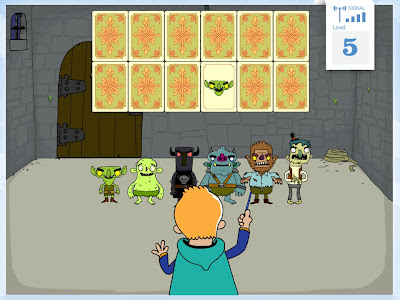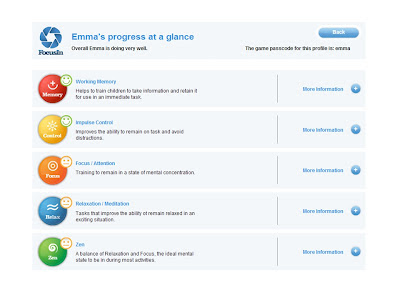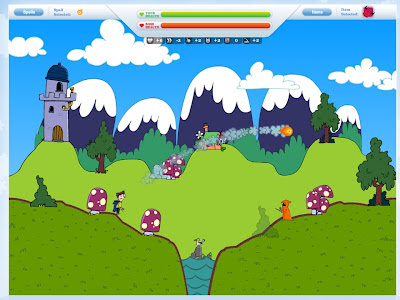Using brainwave-powered feedback is easier than ever thanks to affordable sensors and headsets, plus free apps that work on virtually any system, from smartphones to tablets to laptops. This is a breakthrough for elearners wanting to make sure that they can effectively maintain attention and focus while maintaining a calm, relaxed state that is ideal for learning, especially for elearning, where distractions can be problematic. Welcome to an interview with Dr. Stuart Johnstone, research psychologist at the University of Wollangong, who is heavily involved in developing software such as Focus Pocus that can help learners improve their memory, focus, attention, and emotional state. It can also be used to improve impulse control.
1. What is your name and your relationship to learning?
Dr. Stuart Johnstone. I am an research psychologist at the University of Wollongong (Australia). I do research into neurocognitive training for improving learning outcomes for children with AD/HD and also those without AD/HD. We look at behaviour and brain electrical activity, or EEG, to see if the training has had any benefits for the children. We’ve also looked at using EEG as a way of improving the training outcomes. I’ve consulted with Dr. Joseph Graffi, CEO of NeuroCog Solutions, on behalf of the university in the design of commercial software based on our research outcomes.
2. What are new findings about measuring brainwaves outside the head? Why does it matter? How can the knowledge help you?
People have been recording the electrical activity of the brain from the scalp for nearly 100 years. A really important recent development is the appearance of consumer devices for doing this in an easy and convenient way with dry sensors wirelessly. No need to be stuck in a lab using messy gels and wired up to huge machines!
EEG matters as it gives us information about the neural activity going on in the brain, and tells us things like whether or not a person is calm, or concentrating, for example. We can use that information in a few ways. One is to let the person know how well they were concentrating during some other sort of task, like a memory or maths task. The other is to give them constant feedback about, for example, their concentration level so that they become aware of how it feels to have low and high concentration and possibly learn to control it a bit more effectively.
3. What is the equipment? How easy is it to use it?
The consumer device we’ve used in our research, and that’s used in Focus Pocus, is the NeuroSky MindWave or MindSet. They are simple headsets that record EEG from the forehead area and send that information wirelessly into the computer. They do some calculations to provide a couple of useful measures, one is “attention” which ranges from low to high and the other is “meditation” which ranges from tense to calm. We use them in the software in the ways I mentioned earlier.
The headsets are very straight forward to use. They only take about 10 seconds to fit. No fiddly wires or messy gels like you’d see in the lab or at the neurologist. This was really important for our research as we wanted kids to be able to use it at home on an almost daily basis – put the headset on, start the software and get going.
4. What is Focus Pocus? Describe what is and how it works?
Focus Pocus is a PC game created by NeuroCog. The user is a wizard in training! There are 12 mini-games and a boss level.
It was designed to be a fun way for kids aged 6 to about 12 or 13 years of age to exercise important psychological processes that help them to get the most out of learning situations. Things like being calm and concentrating, holding things in your memory, controlling your impulses and ignoring distractions.
There’s a training mode as well as challenge and multiplayer modes just for fun. The training mode takes a child through 25 sessions of fun training, ending each day with the boss level, where they get to battle the evil necromancer using items they’ve earned during the days training.
The better they do the better their spells and tricks! The training mode is similar to the training used in the research studies which showed that the children’s behaviour improved.
Parents can track their child’s progress using on online app called FocusIn. There is a report generated every day and at the end of the training. Parents of kids in our research studies at the university said that was really important to them, so NeuroCog built it in.
5. How can Focus Pocus be used by adult learners to improve their state control, working memory, and impulse control? Are there techniques that work with adults that are not used with children?
Focus Pocus could be used by adults, but the wizard in training theme was designed mainly with children in mind.
6. What do you see as the future of Focus Pocus and the applications?
I started doing this type of research because parents were constantly telling me they did not want to have to medicate their children who had AD/HD. My hope is that this type of training can be helpful as an alternative to medication, or as an adjunct to it. NeuroCog have done a great job of taking a fairly boring research tool and making it great fun for kids to play.
The good thing is that the principles behind the training methods are relevant for all children so Focus Pocus gives all kids a chance to improve those skills while having fun.
E-Learning Corgi focuses on distance training and education, from instructional design to e-learning and mobile solutions, and pays attention to psychological, social, and cultural factors. The edublog emphasizes real-world e-learning issues and appropriate uses of emerging technologies. Susan Smith Nash is the Corgi's assistant.
Wednesday, February 15, 2012
Friday, February 10, 2012
Interview with Michael Schutzler, Livemocha.com, Innovators in E-Learning Series
New approaches to online learning take advantage of new mobile devices and the willingness of learners to engage across platforms, technologies, and infrastructures. Learning languages is no different, and the focus now with new technologies, which are used in online forums, bachelor degree programs, graduate programs (for example, and online master's in Spanish), and even Ph.D. programs is all about interactivity. Welcome to an interview with Michael Schutzler, CEO of Livemocha.com.



 The Livemocha Scholarship Program, which launched on January 11th, 2012, is needs-based and will give US high schools and community colleges the ability to apply for free or deeply discounted language learning solutions with the goal of rebuilding language training programs to serve our nation.
The Livemocha Scholarship Program, which launched on January 11th, 2012, is needs-based and will give US high schools and community colleges the ability to apply for free or deeply discounted language learning solutions with the goal of rebuilding language training programs to serve our nation.
What is your name and your relation to eLearning?
My name is Michael Schutzler. I am the CEO of Livemocha.com, the world’s largest online language learning community. I have been formally trained as an instructor in several disciplines including Telecommunication Systems Troubleshooting, Water Safety, Zen Meditation, and Executive Coaching. I am an avid technologist, internet entrepreneur and angel investor. I am PASSIONATE about providing teachers useful technologies to make learning both exciting and effective.
What is Livemocha?
Livemocha.com is 13 million people helping each other learn skillful conversation in 38 languages. The company was founded in 2007 and is dedicated to creating a world in which every human being is fluent in multiple languages.
What is Livemocha's instructional philosophy? How does it help with learning language?
First, the team at Livemocha believes that language is a performing art, not merely an intellectual pursuit. Therefore, we emphasize skill development - in particular, we emphasize conversational competency.

We encourage and reward every language learner to try to communicate using the tools he or she learns in each lesson. Since the advent of the Internet and especially with the explosive growth of Skype, Twitter, Facebook, LinkedIn and many other forms of communication - we encourage both typed and spoken conversation skills. Of course, we also encourage each learner to share their own native language skills with other members who are eager to learn.
In this way, everyone gets to fumble for a few minutes with a new language and then shine for a few minutes when they share insights into their own language.

In what directions would you like to see education go? Why?
About sixty years ago, our nation had a wake-up call called Sputnik. Suddenly, we were in a race to ensure that our kids were the best at math and science so we could beat the Soviet Union in military and technical development. Meanwhile, funding for public schools has eroded in the past few decades and the result is a public school system obsessed with math and science curricula while jettisoning the humanities.
We do so at our peril. The rest of the world considers bilingual a baseline requirement for higher education and professional advancement. Those powerful communication technologies I already mentioned (Skype, LinkedIn, etc.) are making it possible for even the smallest company to reach global markets. Among the Fortune 500, more than 30% of the current job openings have bilingual as a requirement. Our education system cannot meet that demand.
Livemocha wants to ensure that every person reaches their full potential through skillful conversation in multiple languages. That’s why we created the Livemocha Scholarship program. By donating 5 million dollars worth of Livemocha services to underfunded community colleges and high schools in 2012, we’re hoping to give teachers the resources they need to help students become global citizens.

What is Livemocha doing to promote language learning?
We are partnering with many organizations throughout the country and around the world. Livemocha is already in use in thousands of high schools, colleges, corporations, libraries, non-profit organizations, government agencies, and more.
Our most recent endeavor helps schools build stronger language programs with the help of native speakers and teachers from around the world.
 The Livemocha Scholarship Program, which launched on January 11th, 2012, is needs-based and will give US high schools and community colleges the ability to apply for free or deeply discounted language learning solutions with the goal of rebuilding language training programs to serve our nation.
The Livemocha Scholarship Program, which launched on January 11th, 2012, is needs-based and will give US high schools and community colleges the ability to apply for free or deeply discounted language learning solutions with the goal of rebuilding language training programs to serve our nation. Schools can find additional information and apply for the scholarship program. Simply visit www.livemocha.com/scholarship or email scholarship@livemocha.com.
Labels:
digital tablet
,
instructional design
,
ipad
,
language learning
,
livemocha
,
mlearning
,
scholarship
Wednesday, February 08, 2012
Enter for a chance to win $100 gift card from Follett Bookstore!
Enter for a chance to win a $100 gift card from Follett! Share your favorite study location and earn an opportunity to win! Send an email to susan@elearningqueen.com that describes your ideal study place and conditions, and we'll put your name in a drawing for the gift card. The winner will be announced on March 15, 2012, and e-Follett will send you the card.
In the meantime, feel free to share your thoughts about and experiences with CafeScribe by posting a comment below. E-Learning Queen will send the link to them to Follett's representative. Your feedback is important!


Labels:
cafescribe
,
connections and iPads
,
digital textbook
,
follett
,
tablets
Monday, February 06, 2012
Teacher Salary
What do you think? Share your own story (post a comment).
Click here for the orginal graphic, with an interesting op-ed piece:
http://www.onlinedegree.com/infographics/teacher-salary


Teacher Salary Infographic created by Online Degree
Subscribe to:
Posts
(
Atom
)
Blog Archive
- 2025 ( 15 )
- 2024 ( 6 )
- 2023 ( 7 )
- 2022 ( 17 )
- 2021 ( 13 )
- 2020 ( 15 )
- 2019 ( 25 )
- 2018 ( 25 )
- 2017 ( 20 )
- 2016 ( 28 )
- 2015 ( 35 )
- 2014 ( 24 )
- 2013 ( 28 )
- 2011 ( 31 )
- 2010 ( 23 )
- 2009 ( 35 )
-
2008
(
61
)
-
June
(
7
)
- Jun 27 ( 1 )
- Jun 19 ( 1 )
- Jun 17 ( 1 )
- Jun 16 ( 1 )
- Jun 12 ( 1 )
- Jun 09 ( 1 )
- Jun 05 ( 1 )
-
May
(
7
)
- May 26 ( 1 )
- May 22 ( 1 )
- May 15 ( 1 )
- May 11 ( 1 )
- May 09 ( 1 )
- May 05 ( 1 )
- May 01 ( 1 )
-
June
(
7
)
-
2007
(
27
)
-
December
(
13
)
- Dec 27 ( 2 )
- Dec 24 ( 1 )
- Dec 23 ( 1 )
- Dec 19 ( 1 )
- Dec 17 ( 1 )
- Dec 16 ( 1 )
- Dec 10 ( 1 )
- Dec 06 ( 1 )
- Dec 05 ( 2 )
- Dec 03 ( 1 )
- Dec 02 ( 1 )
-
December
(
13
)
- 2006 ( 4 )
- 2005 ( 5 )









